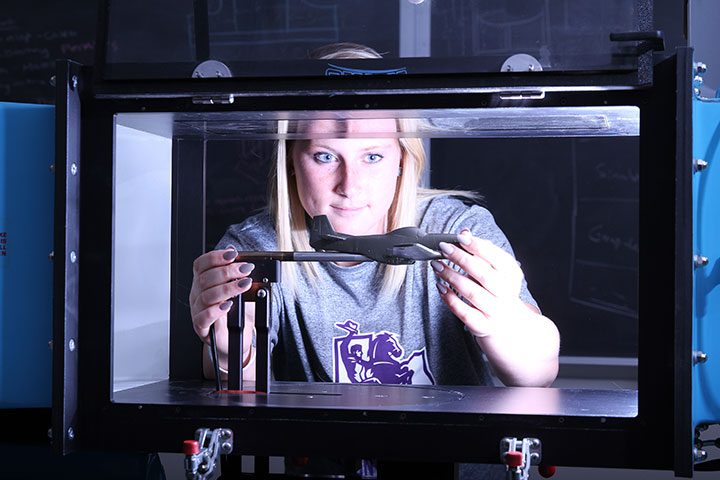Master of Science in Mechanical Engineering
Tarleton State’s Master of Science in Mechanical Engineering (M.S.) degree is an advanced graduate program designed for career advancement and preparation for doctoral-level degree programs.
Delivered both in-person and online, it also allows engineers to further specialize in their professional area of interest, building upon the undergraduate foundation in topics such as robotics, renewable energy, biomedical engineering, aerospace, and automobiles.
Program Format
The mechanical engineering degree is designed to be completed in two years of study and is offered both in-person at our Stephenville, Texas campus and online through a combination of synchronous and asynchronous coursework.
Accelerated Graduate Pathway for Tarleton Undergraduates
Qualified undergraduate Tarleton students have the opportunity to be approved early for graduate study. This option allows them to begin taking master’s courses during their senior year, positioning them to earn bachelor’s and master’s degrees in Mechanical Engineering in just five years.
Thesis and Non-Thesis Options
The program offers two pathways to a master’s in mechanical engineering—thesis and professional (non-thesis). Both paths are rich with required transformative independent research work culminating in several hands-on projects. Both options feature a rigorous curriculum while allowing students to concentrate on their preferred specialization.
Students electing to pursue the thesis option identify a research project that the Graduate Office approves and then defend the thesis before an advisory committee of Tarleton faculty and the head of the ENCS Department.
What is Mechanical Engineering?
Mechanical engineers design and implement innovative, real-world solutions to complex problems related to mechanical, thermal, and fluid systems by applying interdisciplinary principles of engineering, science, and mathematics. While developing these solutions, they also consider public health, safety, and welfare and global, cultural, social, environmental, and economic factors.

Estimated Completion
33 credit hours (2 years)
Application Process
Cost
Locations Available
- Stephenville
- Online (remote synchronous and remote asynchronous course options)
College
In today’s world of rapid change, innovations and advancements in mechanical engineering strengthen the quality of life by making it safer, more enjoyable, and more productive. Tarleton educates and trains highly skilled and experienced mechanical engineers to meet growing workforce needs in Texas and the United States.
Careers in Mechanical Engineering
Anything that involves force, energy, or motion involves mechanical engineering. As mechanical engineers design and work with all types of mechanical systems, careers in this field span across many industries.
A mechanical engineer working in the aerospace industry could design the next big energy-efficient jet engine. The robotics industry employs mechanical engineers who build robots that help save lives. The entertainment industry also demands the talents of mechanical engineers who design grand, moving Broadway stages and thrilling roller coaster rides.
According to the American Society of Mechanical Engineers (ASME), aspiring engineers can find a career in just about any industry, including:
- Aerospace
- Agriculture
- Automotive
- Bioengineering
- Design
- HVACR: Heating, Ventilating, Air Conditioning, and Refrigeration
- Manufacturing
- Materials
- Nuclear
- Petroleum
- Robotics
- Sustainable Energy
- Systems
- Tribology
How much do Mechanical Engineering graduates make?
The Bureau of Labor Statistics reports that mechanical engineers earn an average annual salary of $90,160.
Learn more about Graduate Studies at Tarleton!
What courses will you take in the Mechanical Engineering master’s degree?
The Master of Science in Mechanical Engineering (MEEN-MS) degree program is an industry-focused, practice-oriented degree that deepens mechanical engineering skills in design, manufacturing, controls, robotics, and energy and sustainability.
The main areas of study in our MEEN-MS program represent highly sought after skills across the mechanical engineering field, both in Texas and across the country, including:
- Mechanics of Solids and Materials
- Design, Manufacturing, and Materials Selections
- Thermal-Fluid Systems and Heat Transfer
- Power, Energy, and Sustainability
- System Dynamics, Controls, and Robotics
- Nanotechnology and MEMS Devices
- Advanced Performance Materials and Structural Health Monitoring
Thesis and Non-Thesis Required Courses
Students in the professional non-thesis pathway take 12 defined credits of coursework in Finite Element Analysis, Lean Six Sigma, Computational Methods for Fluid Mechanics and Heat Transfer, and Advanced Energy Systems.
Thesis-track students take a six-credit Master’s Thesis course and choose six additional credits of coursework in the same courses defined above for non-thesis students.
Explore all M.S. in Mechanical Engineering required courses.
Student Resources
Scholarships and Financial Aid
Graduate mechanical engineering students may qualify for a number of program and departmental scholarships. Applicants can complete the Common Application to be considered for all Tarleton scholarships and financial aid opportunities.
Accreditation
- Tarleton’s Master of Science in Mechanical Engineering degree is accredited by the Southern Association of Colleges and Schools Commission on Colleges (SACSCOC).
- The Mechanical Engineering (MEEN) program at Tarleton State University is accredited by the Engineering Accreditation Commission of ABET, under the General Criteria and the Mechanical Engineering Programs Criteria. The accreditation action was retroactive on October 1, 2017. View ABET status and information.
What Tarleton master’s degrees are related to Mechanical Engineering?
In addition to the M.S. in Mechanical Engineering, Tarleton offers related graduate programs in mathematics and other engineering disciplines.
Earn your master’s in Mechanical Engineering through Tarleton State!
Tarleton State University’s Master of Science in Mechanical Engineering degree is the launching pad for rapid career advancement and the first step toward a doctoral degree program. Offered both in-person and online, this transformative graduate degree program builds experienced, specialized mechanical engineers that are ready to make a difference in any industry.
Ready to get started? Request more information to learn more, or apply now!


